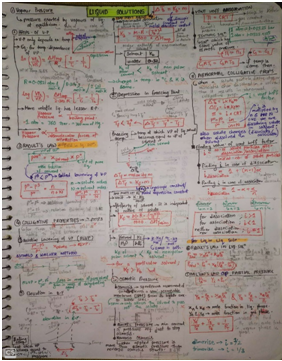How to Make Notes for JEE: Everything You Need to Know

Creating effective study notes is crucial for success in JEE. In this guide, we’ll explore how to make notes for JEE that enhance your understanding. When it comes to JEE Main or Advanced you don’t need to make notes on anything and everything you read. Your primary concern must be to listen to the class, read study material (RAA notes or NCERT or reference books), and then make notes of important points.
Learn strategies to make notes for JEE, ensuring efficient revision and better concept clarity. Whether it’s short or detailed notes, these tips will help you organize your preparation and maximize your performance.
Why You Need to Make Notes
Making notes for the JEE exam can be daunting, yet making your own notes is important. Let’s understand why.
- Concept Clarity: Summarizing topics helps reinforce understanding and clarifies complex concepts. Writing down key points ensures that you grasp the material thoroughly and can explain it in your own words, making difficult topics easier to comprehend.
- Efficient Revision: Condensed notes make it easier to review key points quickly, especially during exam preparation. When exams are near, concise notes allow you to review the essential material without wasting time searching through textbooks or lengthy chapters.
- Active Learning: Creating notes involves active engagement with the material, leading to better retention. By actively processing and organizing information, you are more likely to remember it compared to passive reading.
- Personalized Learning: Tailoring notes to your understanding helps address personal weaknesses and strengths. Personalized notes cater to your unique way of learning, focusing on areas where you need more practice and reinforcing concepts you find challenging.
- Quick Reference: Well-organized notes serve as a quick reference during problem-solving and revision. Having a reliable set of notes at hand allows you to quickly refresh your memory on formulas, concepts, and techniques without wasting time.
Preparing your own notes fosters deeper understanding and long-term retention, tailoring it to your learning style, developing critical thinking skills, and increasing confidence. This personalized approach surpasses the passive consumption of pre-made notes from Toppers.
How to Make Notes for JEE: Main & Advanced
You can prepare two types of notes while you are studying JEE: short notes, and long notes. Here is how to do it:
1. How to Prepare Long Notes for JEE
When you go over the topic on your own after the class, that’s when you should make detailed notes. These self-notes are made from a variety of sources, such as what you remember, your class notes, references or guides, and so on.
Tips For Long Notes:
- First things first, use two or three different colored pens for proper understanding and to avoid clumsiness. Use black and blue for questions and answers, a red pen for important formulas/points/tips/tricks and green pen for exceptions.
- Write brief summaries at the end of each chapter to encapsulate key learnings and ideas. Leave 3 to 4 pages after every chapter because if you need to note down any question or tips on that topic in the future, you will get the space.
- Sometimes after telling any theory or formula, teachers go on to explain them. Often while explaining, teachers state many important things worth noting. Students should quickly right down those things in their own way and in any language. You can use various abbreviations in your own creative way. The point is that you do not need to stick to any specific style of writing the lectures. Create your own way.
- After writing down any formula, put a single tick mark on it. After coming home when you revise the same thing, make it a double tick mark. This way you will knowhow many times you revised the formulae.
- Utilize the upper portion of your notebook to write tips and tricks or any important points in that area.
- Separate all your notebooks based on subjects and chapters. You can put a sticker on the cover page to determine which chapters are written in that particular notebook.
- Make three kinds of notebooks: (a) Normal notes, (b) Notes for modules/sheets/DPP/PYQs and (c)Error log / Analysis notes for Daily Practice Papers or Sample Test Papers.
2. How to Prepare Short Notes for JEE
Preparing short notes is tricky but also an essential part of JEE preparation because when the exams knock at the door, it is only the short notes that rescue you.
Make short notes only after reading/revising the chapter from RAA notes/NCERT/reference books/long notes or after giving multiple tests/DPPs. It’s a chapter summed up in no more than two pages – just use it as a guide.
Step by Step

| 1.Plan your subtopic 2. Divide your A4 size page into 2-3 parts 3. Write headings in bold fonts (Blue/Black pen). Later use red pen for writing important formulas, results, and special cases. Use a green pen to write exceptions. 4. Make a mind map of what you will write in 1–2 pages only (essence of a short note) 5. Make flowcharts and diagrams.Be very concise and still elaborate in your own words. 6. Use every possible space to make it short and not too long 7. Leave some space (if you come across any new concept later on). |
Subject wise Recommendation:
- For Maths & Physics numerical, use the Simple-Medium-Complex (SMC) technique for problem-solving. Label each problem as Simple (S), Medium (M), or Complex (C) based on how difficult you find them. In your next round of revision, focus only on the M and C problems. After solving them, update their labels to S, M or C as needed. This method will make your revision quicker and more effective by focusing on problems that challenge you.
- For physics, write down the most important numbers first, then some ideas and ways to solve a certain kind of question.
- For chemistry, write down all the subtopics that make up a section and then try to remember what that section was about
- Write down rules for physical chemistry. A lot of people don’t take notes on basic chemistry.
- Add mind maps and Revision charts of Organic and Inorganic chemistry. You can simplify your Organic and inorganic reactions by making root charts.
- For Maths,make a card for formulae. Solve problems and maintain error log.
- For theoretical topics, start highlighting keywords, making notes on important points, and marking up important questions
- For numerical, include techniques, shortcuts, and common errors. Keep a separate page to record insights gained from solving DPPs, tests, or previous year questions (PYQs) for efficient revision later.
A few key things for Effective Note-Making
- Stay Consistent: Use the same format and style throughout your notes for uniformity. This consistency helps you find information quickly and keeps your notes organized.
- Be Selective: Focus on important concepts rather than transcribing everything from textbooks. Identify key points, formulas, and definitions that are crucial for understanding and revision.
- Engage with the Material: Ask questions, make connections, and note down any doubts to research later. Active engagement with the content ensures better retention and comprehension.
- Incorporate Diagrams and Charts: Visual aids like diagrams, flowcharts, and tables can help illustrate concepts and make recall easier. These tools can simplify complex information and provide quick references during revision.
- Periodically Revisit and Update Your Notes: Regularly review and update your notes to ensure they remain relevant and effective. This practice helps reinforce your memory and keeps your notes accurate.
- Consider Using Apps or Software for Note-Taking: Digital tools like OneNote and Notion can enhance organization and accessibility. These apps allow you to categorize information, add multimedia elements, and access your notes from multiple devices.
RAA Can Be Your Notes Headache Solution Too!
Rathi’s Aspire Academy (RAA) provides advanced coaching for competitive exams like MHT-CET, NEET, and IIT JEE Classes in Wakad in addition to comprehensive board education for HSC, CBSE and ICSE (Class VIII to XII). Through our concept-based teaching method, we make sure that all of our students are ready for both competitive tests and board exams by giving them everything they need, from Previous Year Question papers (PYQs) to daily practice papers (DPPs).
For our students, RAA is the best coaching center in Wakad, and by giving each student individualized attention and academic preparation, here we help them reach their academic and professional career goals. We help parents keep an eye on their child’s college work even when they have a lot going on by giving them regular reports.
The Sum-Up
Above we have demonstrated how you write short and long notes that get the job done. Whether you’re working on short notes for JEE Main and Advanced, long notes for noting year-long learning, or revision notes for final exam days, each type serves a specific purpose in helping you master the vast syllabus of JEE Main and Advanced. With dedication, the right strategy, and effective notes, you can confidently tackle the JEE and achieve your academic goals. So, when pondering how to prepare notes for JEE, keep these strategies in mind, and you’ll be well on your way to success.



